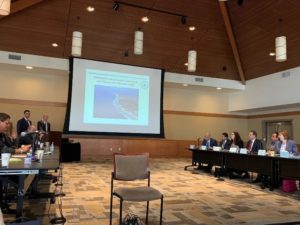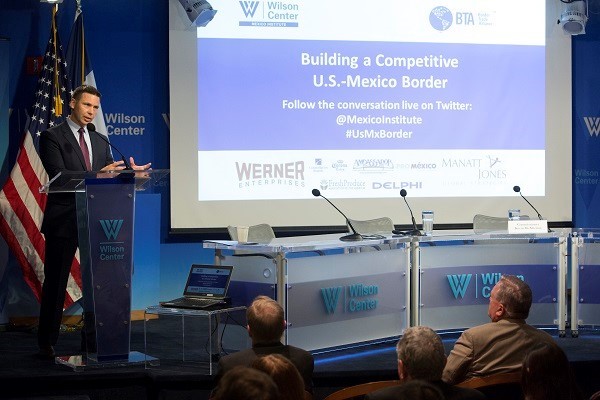June 11, 2019
The Chamber met with regional stakeholders from both sides of the border to discuss initiatives and infrastructure projects to address the Tijuana River Valley transboundary pollution. This meeting was co-hosted by The U.S. Customs and Border Protection (CBP), U.S. Environmental Protection Agency (EPA), and the U.S. International Boundary and Water Commission (IBWC). The agenda included presentations from the North American Development Bank (NADBank), California Environmental Protection Agency, San Diego Regional Water Quality Control Board, EPA, CBP, and IBWC.

In addition, Chamber Director of International Business Affairs Kenia Zamarripa, in her role as a member of the USIBW Citizens Forum, participated in a quarterly meeting where the community received a presentation from Mayor of Coronado Richard Bailey on the impact of polluted flows and the City’s strategy to minimize pollution. At each meeting, NADBank presented results from their evaluation of alternatives and solutions, which was overseen by the IBWC, EPA, Mexico’s National Commission of Water (CONAGUA), the State of Baja California’s Commission of Public Utilities (CESPT), and a group of stakeholders from the public and nonprofit sectors.
The assessment evaluated alternatives and infrastructure projects addressing transboundary pollution based on their contribution in reducing beach closures and transboundary flows per year, which for the last few years have averaged a total of 138 days. Alternatives included projects on both sides of the border, such as optimizing existing facilities with improvements in Mexico and a new lift station in the U.S. to discharge at the south bay international wastewater treatment plant for primary treatment only. NADBank’s conclusions highlighted that improving operation and maintenance on the existing system would reduce transboundary flows by nearly 30 percent (down to 98 days per year), Mexican-side alternatives would be the most cost-effective, and continued investment in infrastructure outside the diversion system is necessary.
The Chamber continues to advocate for the U.S. and Mexican governments to design a work plan between both governments to increase measurable efforts in mitigating the pollution and minimizing/eliminating water deficits to the U.S. Next steps focus on evaluating top alternatives to determine a joint cross-border plan of action that stakeholders from both sides of the border can advocate for and advance together.
California State Senator Ben Hueso introduced SB 690 requiring the San Diego Water Board to negotiate an interagency agreement whereby the state would direct the planning, design, permitting, and construction of a project to capture sediment, solid waste, and polluted flows in the Tijuana River. In addition, the bill requires an equal match on funding for the project, and the federal government would take responsibility for the ownership, operation, and maintenance of the project. The Chamber’s International Affairs Committee voted in support of the bill, with suggested amendments by the City of Imperial Beach.


